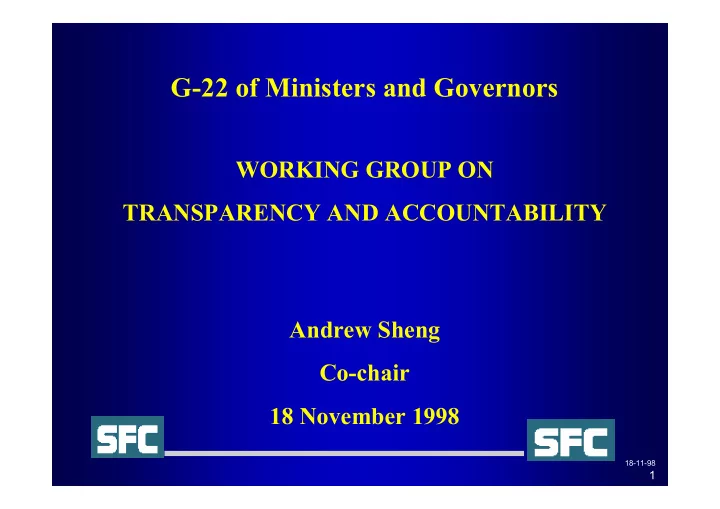

G-22 of Ministers and Governors WORKING GROUP ON TRANSPARENCY AND ACCOUNTABILITY Andrew Sheng Co-chair 18 November 1998 18-11-98 1
G-22 Background Established in April 1998 in Washington DC to look at issues relating to new international financial architecture in wake of the Asian crisis Informal group of 7 industrial and 15 emerging market economies, with IMF, World Bank, BIS, OECD, IOSCO as observers 18-11-98 2
Three Working Groups for three key issues Transparency and Accountability – cochaired Mervyn King & Andrew Sheng Strengthening Financial Systems – cochaired Mario Draghi & Pablo Guidotti International Financial Crises – cochaired David Lipton & Martin Werner 18-11-98 3
Work Process Three meetings each to discuss work and agree on key issues and recommendations 6 co-chairs/secretariat co-ordinated work programme Reports completed/submitted to Annual Meetings, October 1998 Recommendations adopted by G22 Ministers and Governors Meeting on 5 October, 1998 18-11-98 4
Issues at stake Global markets - national standards, laws and regulations – large regulatory and information gaps Whatever “global standards” that exist are not well enforced Entry into markets restricted, competition stifled and exit mechanisms and laws are totally obsolete 18-11-98 5
Issues at stake (cont’d) Macro-economic issues well understood, but not micro-structure of markets Need to deal with over-leveraging and bring in private sector for burden sharing [moral hazard issues] 18-11-98 6
Key Recommendations: WG2 Standards – broad international consultative process – endorse and urge implementation of existing principles – to be set on corporate governance Safety nets – method of structured early intervention in banking sector 18-11-98 7
Key Recommendations: WG2(cont’d) Implementation of standards and sound practices – supports Basle Committee work on asset valuation and loan loss provisioning – to set up principles guiding market access for banks International co-operation – urge implementation of G-7 Principles for Information Exchange 18-11-98 8
Key Recommendations: WG3 To reduce frequency and limit severity of crises – limit explicit and implicit govt guarantees – greater use of innovative financing techniques – effective insolvency and debtor-creditor regimes To encourage creditor co-ordination – adopt “collective action clauses” 18-11-98 9
Recommendations: WG3 (cont’d) To promote orderly, co-operative, and equitable crisis resolution – rapidly implement IMF quota increase – enhance framework for crisis management that allows promotes orderly workout – supports IMF to provide financial support despite arrears on a country’s obligations to private creditors, under certain conditions 18-11-98 10
WG1 - Premises Transparency and accountability help to improve economic performance There are limits to transparency Transparency applies to three groups: – private sector – national authorities – international financial institutions 18-11-98 11
WG1 - Gaps in Information Gaps in disclosure Gaps in incentives to use information Gaps in capacity to absorb information Gaps in regulatory net Fallacy of composition problem 18-11-98 12
WG1 - Basic thrust Bad accounts = Bad statistics = Bad risk management = Bad decisions and policies = Financial crisis 18-11-98 13
Recommendations - Private Sector (1) National standards for disclosures to reflect five basic elements: – timeliness – completeness – consistency – risk management – audit and control processes 18-11-98 14
Private Sector (2) a core set of accounting standards by the International Accounting Standards Committee (IASC), and a timely review of these standards by the International Organization of Securities Commission (IOSCO) Work to complete by end 1999 18-11-98 15
Private sector (3) Examine modalities of compiling and publishing data on international exposures of investment banks, hedge funds, and other institutional investors Working group to be formed to look at how to compile information by September 1999 18-11-98 16
National Authorities - 1 Foreign exchange liquidity position – Major gap in FX data in Thai crisis – timely, accurate, and comprehensive data, including forward books – preferably also that of the public, financial, and corporate sectors – details being studied by BIS, to be followed up by IMF 18-11-98 17
National Authorities - 2 Observe Code of Good Practices on Fiscal Transparency – Lack of government balance sheet hides fiscal laxity To draft code of best practices on monetary policy transparency IMF to follow up 18-11-98 18
International Financial Institutions (IFIs) No funding without greater accountability IFIs have to be more transparent and accountable to public Presumption to release information – Except where well-articulated definition of confidentiality applies 18-11-98 19
International Financial Institutions (2) IMF to publish – Letters of Intent – background papers to Article IV reports – Public Information Notices Greater cooperation with private sector bodies 18-11-98 20
International Financial Institutions (3) Multilateral Development Banks to publish – country assistance strategies – progress reports – environmental impact assessments – internal and external evaluations – policy papers 18-11-98 21
Transparency Report Need to be transparent about transparency – tell the truth about the degree of transparency Transparency Report – to be prepared by the IMF, possibly during Article IV consultations – to summarise the degree to which an economy meets internationally recognised disclosure standards 18-11-98 22
Way forward Recommendations adopted by G22 Ministers and Governors Meeting on 5 October, 1998 G22 now G26 [G10 + 15 emerging markets] BIS/IMF likely to set up additional working groups to examine indepth issues and follow-up 18-11-98 23
Recommend
More recommend